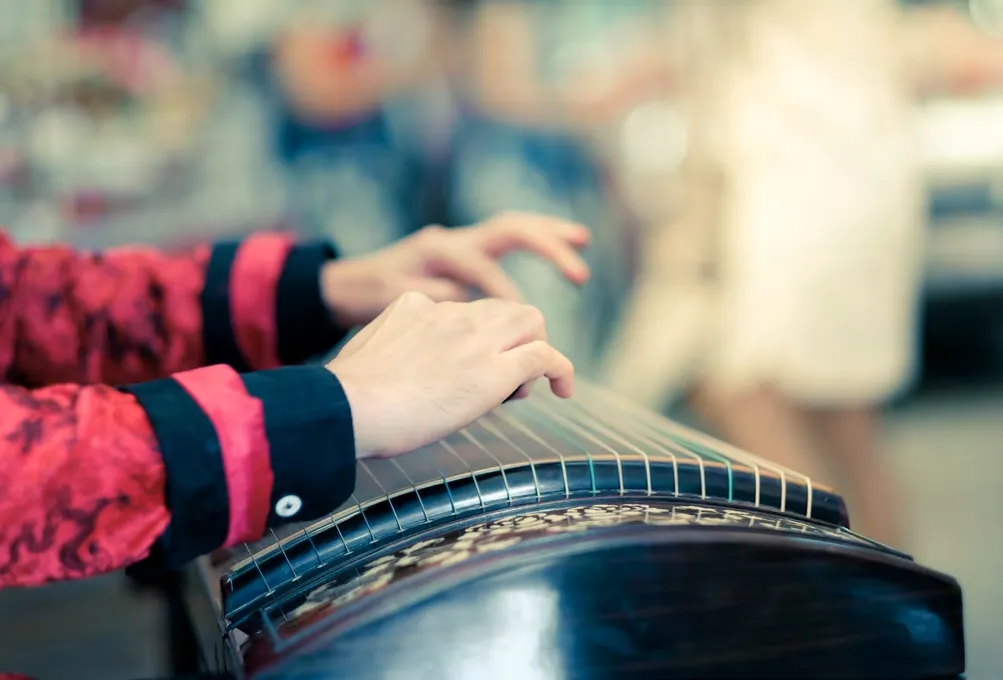乐
By Huang Lu & Zou Xinsheng

Happiness is the vital ingredient in life,imbuing people with joy and inspiration.
When it comes to the elixir of “happiness,” a multiplicity of factors come to mind that can shed light on this mystery, among which the Chinese character 乐(lè/yuè) provides several hints to this ancient secret.
As recorded in oracle-bone inscription (甲骨文 jiá gǔ wén),乐 is comprised of two parts:the upper part resembles 松塔 (sōngtǎ, pinecone) and the lower part 树木 (shùmù, wood or tree) which is indispensable to the dance art created by ancient people during activities such as sacrifices, hunting, and so on.For one thing, pine branch full of oil is the marvelous fuel, and for another, the blazing fires crackle to add joys to life. It seems to be where the character “乐 ”originally came from.
In another perspective, the upper part of 乐 resembles 丝弦 (sī xián, silk string) and the lower part 木架子 (mù jià zi,wooden rack), from which people deduce 乐 is a primitive stringed instrument.
From the simple structure of the character 乐, people may infer that happiness exists in simplicity.
Chinese characters boast a background of profound culture,from which individuals may come to a rational conclusion of happiness.
The most original and prevalent definition for the character 乐 is 快乐 (kuàilè)meaning “happy, joyful,” as illustrated inXinhua Chinese Dictionary. It has graced Chinese philosophy and the Chinese mindset thousands of years.
“有朋自远方来,不亦乐乎” (yǒu péng zì yuǎnfāng lái, bú yì lè hū)“Is it not a pleasure to see friends from afar? ” The Confucius edict inThe Analects(《论语》lún yǔ)epitomizes China as a friendly nation and committed partner since ancient times.
One of the famous idioms,“怡然自乐 ” (yíránzìlè) “happy and contented,” reflects the pleasures of harmony, quoted fromThe Peach Colony(《桃花源记 》táohuāyuán ji) by Tao Yuanming, the foremost paragon of Fields and Gardens poetry of Chinese literature, in which Tao portrayed a utopia of peace, joy and freedom.
Another source of happiness is heart of gratefulness. When such a heart prevails, the flower of happiness will bloom in one’s mind. It is true that the happiest people do not necessarily have the best of everything, they may actually just be thankful for what they have. 知足常乐(zhīzúchánglè, A contented mind is a perpetual feast) is the best presentation for that idea of self-satisfaction and, further—gratitude.
As its hieroglyphic structure suggests, 乐 is a character of versatility in not only sense but also pronunciation. It can be referred to 音乐 (yīnyuè)meaning “music” with a different pronunciation.
乐is a generic term for music,as recorded inShuowen Jiezi(The Origin of Chinese Characters), the first Chinese Dictionary known in history. For instance, 乐 器(yuèqì, musical instrument), 乐理 (yuèlǐ, music theory). As a universal language, music has an air of cheer, helping to spread happiness, which reflects the original definition of 乐 as well as the wisdom in Chinese culture.
How to seek happiness is an ongoing debate, where dreary clichés about the best approach to finding happiness abound.Nevertheless, the character 乐itself is found to be the compass with which to locate the elusive thing called happiness, which is actually relative to each individual. But if one sincerely desires to edify and uplift the beauty of Chinese culture, then happiness is surely around the corner.


